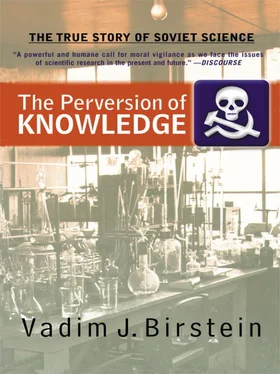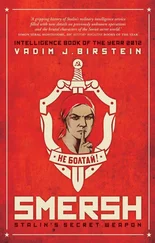Agoshkov, Mikhail(1905–?), mining specialist. Graduated from the Far East Polytechnic Institute in Vladivostok (1931). At the North Caucasus Mining Metallurgical Institute (1933–1941); later at the Academy Institute of Mining; deputy director there from 1952. Corresponding member (1953), academician (1981). Until 1960, head of the Academy Foreign Section, then deputy and acting chief scientific secretary of the academy. Stalin Prize in 1951. Coauthored the textbook Development of Ore and Loose Deposits with NKVD/MGB investigator Vladimir Boyarsky, who had never been trained in geology. Later Boyarsky received a Doctor of Sciences degree and became a senior editor at the Academy of Sciences press, Nauka .
Agranov, Yakov(1893–1938) joined the VCheKa in 1919. Plenipotentiary and deputy head of the Special Department (1919), head of the Special Bureau for Deportation of Anti-Soviet Elements and Intelligentsia (1921–1923). From 1923 on, key positions within the GPU/OGPU. Head of the Moscow OGPU (1931–1934), first deputy NKVD commissar (1934–1937). Supervised all main Moscow show trials of the 1930s. In 1937, transferred to the city of Saratov. Arrested; executed on August 1, 1938. Not rehabilitated (Petrov and Skorkin, Kto rukovodil NKVD , p. 82–83).
Alekhin( Smolyarov) , Mikhail(1902–1939) joined the CheKa in the city of Nikolaev in 1921. From 1931, in Moscow, then Leningrad (1934–1937). Deputy head of the Twelfth Department of the NKVD Main State Security Directorate (from 1937), and acting head of the Second Special (Operational Equipment) Department (1938). Arrested on September 13, 1938. On February 22, 1939, sentenced to death and shot. Not rehabilitated (Petrov and Skorkin, Kto rukovodil NKVD , p. 88).
Aleksandrov, Georgii(1908–1961), philosopher. Joined the Party in 1928. Graduated from the Moscow Institute of History and Philosophy (1932). Head of the Directorate of Propaganda and Agitation (Agitprop) within the Central Committee (1940–1947), director of the Academy Institute of Philosophy (1947–1954). Academician (1946). Played an important role in the Soviet anti-Semitic propaganda during the 1940s and early 1950s. Minister of culture (1954–1955), then at the Institute of Philosophy (1956–1961). Stalin Prize in 1943 and 1946.
Andropov, Yuri(1914–1984), KGB chairman and Party general secretary. Second secretary of the Petrozavodsk City Committee, then second secretary of the Central Committee of the Karelo-Finnish Republic (1944–1952). From 1952, at the Central Committee in Moscow, then head of the Fourth European Department in the Foreign Ministry. Ambassador to Hungary (1953–1957). Organizer of the military suppression of the Hungarian Revolution in 1956. KGB chairman (1967–1982), Party general secretary and chairman of the Presidium of the USSR Supreme Council (1982–1984) (Volkogonov, Dmitri, Autopsy for an Empire: The Seven Leaders Who Built the Soviet Regim e, ed. and trans. Harold Shukman [New York: Free Press, 1998], pp. 329–382).
Antonov-Ovseenko, Anton(b. 1920), historian and writer. The son of a Bolshevik military leader and Commissar of Justice Vladimir Antonov-Ovseenko (executed in 1938). Arrested in 1940 and spent 13 years in different labor camps.
Astaurov, Boris(1904–1974), embryologist and geneticist. At Nikolai Koltsov’s Institute of Experimental Biology since 1935. Corresponding member (1956); academician (1966). Active anti-Lysenkoist. Director of the Academy Institute of Developmental Biology, which he created as a continuation of Koltsov’s institute (1967–1974).
Bach(or Bakh) , Aleksei(1857–1946), biochemist and revolutionary. From 1885, in emigration in France, United States, Switzerland. Returned to Russia in 1917 after the Bolshevik Revolution. From 1918, headed the Central Chemical Laboratory under the All-Union Council of People’s Industry (VSNKh), which in 1935 became the Karpov Physical-Chemical Institute. In 1920, organized the Institute of Biochemistry within the Commissariat of Health, and in 1935, another one, within the academy. From 1927, head of the All-Union Association of Workers of Science and Technique to Assist the Socialist Construction (VARNITSO), which played the crucial role in the Sovietization of the academy. Academician (1929), secretary academician of the Academy Chemistry Department (1939–1945).
Baev, Aleksandr(1904–1994), molecular biologist. Graduated from the Medical Faculty of Kazan University. From 1935, at the Bach Institute of Biochemistry in Moscow. Arrested in 1937. Released in 1944; lived in the cities of Norilsk and Syktyvkar. Defended a Candidate of Science thesis in Leningrad (1947) with the help of Vladimir Engelhardt and Leon Orbeli. Rehabilitated in 1954. From 1959, at the Institute of Molecular Biology (Moscow). Corresponding member (1969), academician (1970). Secretary academician of the Academy Biophysics, Biochemistry, and Chemistry of Physiologically Active Compounds Division (1970–1988). From 1988, adviser to the Academy Presidium; a member of the USSR Inter-Agency Scientific and Technical Council, which coordinated secret development of new types of biological weapons. Honorable member of the European and American academies and societies. President and past president of the International Biochemical Union (1976–1982).
Bashtakov, Leonid(1900–1970) joined the OGPU in 1923. From 1938, head of different divisions within the NKVD First Special Department (in charge of registration). Head of the NKVD First Special Department (1940–1941), head of the NKGB Second Department (1941–1942). Together with Vsevolod Merkulov and Bogdan Kobulov, responsible for the Katyn Massacre in 1940. Head of the High School of the NKVD/NKGB/MGB (1942–1947). Retired in 1951. Head of the Secret Enciphering Department of the USSR Ministry of Geology (Petrov and Skorkin, Kto rukovodil NKVD , pp. 101–102).
Belozersky, Andrei(1905–1971), biochemist, specialist in nucleic acids chemistry. Established the presence of nucleic acids in plants and bacteria (from the 1930s–1950s); later specialized in molecular evolution. Corresponding member (1958), academician (1962). Secretary academician of the Academy Biochemistry, Biophysics, and the Chemistry of Physiologically Active Compounds Division (1970–1971). Organizer and head of the Moscow University Inter-Faculty Laboratory of Bioorganic Chemistry (now Belozersky Institute of Physico-Chemical Biology).
Berg, Axel(1893–1979), a marine officer and radiophysicist, the main Soviet expert in military radio technical equipment and a pioneer in the development of the Soviet theory of information, computers, electronic industry, and applied aspects of information theory in biology and medicine. From 1943, deputy minister of electronic industry, and in 1953, deputy defense minister. Academician (1946). In 1953 organized the Academy Institute of Radiotechnology and Electronics. Retired from the army in 1960. Chair of the Scientific Council on the Complex Problem “Cybernetics” under the Academy Presidium.
Berg, Lev(or Leo) (1876–1950), zoologist, ichthyologist and a geographer. Graduated from Moscow University (1898). From 1917, at Petrograd (Leningrad) University and other colleges. Head of the Special Ichthyology Laboratory within the Institute of Zoology in Leningrad (1934–1950). Corresponding member (1928), academician (1946). Published more than 1,509 papers and monographs in different languages on 17 main topics. Anti-Lysenkoist. His theoretical books Nomogenesis or Evolution Determined by Law (1922 in Russian; translated into English in 1969) was furiously criticized by Soviet philosophers and Lysenkoists. Stalin Prize post mortem (1951).
Читать дальше











